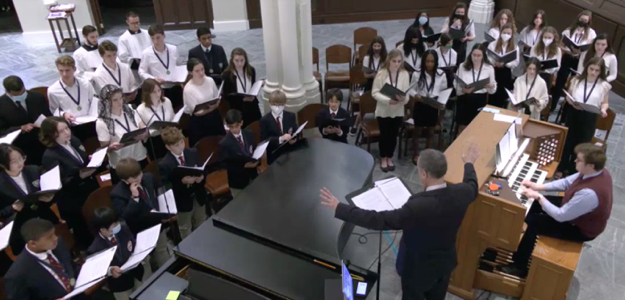 AINT AUGUSTINE’S famous and likely apocryphal quote “He who sings once prays twice” holds universal appeal for its inherent truth regardless of who said it. We do know Saint Augustine stated, “Singing is for the one who loves.” (St. Augustine, Sermo 336, 1 -PL 1844-1855, 38, 1472) Equally truthful, this quote appears in the first page of the US Bishops’ “Sing to the Lord: Music in Divine Worship.” It eloquently distills why we sing: “Singing is a sign of God’s love for us and our love for him.” (SttL§6)
AINT AUGUSTINE’S famous and likely apocryphal quote “He who sings once prays twice” holds universal appeal for its inherent truth regardless of who said it. We do know Saint Augustine stated, “Singing is for the one who loves.” (St. Augustine, Sermo 336, 1 -PL 1844-1855, 38, 1472) Equally truthful, this quote appears in the first page of the US Bishops’ “Sing to the Lord: Music in Divine Worship.” It eloquently distills why we sing: “Singing is a sign of God’s love for us and our love for him.” (SttL§6)
Choirs, musicians, and artists have suffered great loss in the last two years. Countless have persisted creatively and with endless adaptation. Our liturgies have demanded radical adjustments often with little notice. Perhaps there is no better touchstone for the tenacious flexibility of parish musicians than Holy Week of 2022, one different from each of the previous two years. As such, I wish to express great admiration and offer encouragement.
It is time.

![]()
MANY CHOIR DIRECTORS — even those with relatively robust choral programs of children and adults — acknowledge the necessary rebuilding process especially with children’s choirs. This challenge is worldwide. A notable director of multiple children’s choirs in Europe told me numbers are down not because people don’t want to sing, but because recruitment and development stopped for over a year while other children aged out of the program. Yet they persist now in performing even if with smaller numbers. This in turn models possibilities, drives recruitment, and offers some foundation upon which to rebuild.
Another prominent choir director in the United States noted the changing habits of families resulting in fewer children singing. Older children often moved on to other non-musical activities. This leaves younger and less experienced singers to take on more responsibility within a smaller ensemble.
The task before you has not not easy!
Of profound concern is changing habits of some that no longer include attending Mass in person or otherwise. Nothing replaces worshiping in the presence of the Real Presence! The consequences are devastating. We are at risk of losing a generation of children uneducated and unacclimated to the sacred and the transcendent — not to mention the impact upon their souls. The children are robbed not only of singing the Lord’s praise, but robbed of their relationship with God inherent in their baptism and inherently expressed through music.
It is time.
It is past time.
I have been greatly uplifted in recent months and during the last two years by those creatively keeping the beacon of light of sacred music alive and even thriving. Doing so bolsters us all. Now it is time to rebuild, restart, renew commitment to children’s and adult choirs for the sake of catechesis and evangelization. Have not our liturgies required multiple radical adaptations during the last two years? So may our choirs require adaptation — and creative solutions — in order to persist, survive, and thrive. Many are!
Adapt repertoire. Adapt the use of personnel. Perhaps add adults to assist smaller numbers of children to foster development. Adults and children singing together at times is a very common practice taking myriad forms both formal and informal. It is a practice with history and tradition of well over a millennium. Tenacity amidst challenge fortifies the soul, spirit, and in time elevates art and beauty. My admiration for countless parish choir directors for their tireless efforts is beyond words.
![]()
WHY DO WE PERSIST?
It is so easy to give up, to differ, to delay (with every understanding to those who are immunocompromised; my family includes several). Children in particular have lost too much in the last two years. As a father of four I see their struggles; I see their tenacity and that of their friends and classmates. Often the children are wonderful examples to us all.
Matthew 18: 2-3 He called a child over, placed it in their midst, and said, “Amen, I say to you, unless you turn and become like children, you will not enter the kingdom of heaven.”
We persist because when one sings, the Kingdom of God is found not beyond one’s reach, but within your heart. Singing even with smaller numbers is like the mustard seed:
Matthew 13: 31-32 “The kingdom of heaven is like a mustard seed that a person took and sowed in a field. It is the smallest of all the seeds, yet when full-grown it is the largest of plants. It becomes a large bush, and the ‘birds of the sky come and dwell in its branches.’”
We persist because singing is a treasure of inestimable value to be pursued inexorably. It brings us in closer relationship with God and with each other.
Matthew 13:44 “The kingdom of heaven is like a treasure buried in a field, which a person finds and hides again, and out of joy goes and sells all that he has and buys that field.”
DO NOT BE DISCOURAGED, but be joyful! The small or imperfect efforts we make now become the mustard seed that transforms a life forever. The seed you plant may convert one soul or many souls. The seeds you plant may in time save us all. Be joyful. It is time to reclaim our humanity with song. It is past time to reclaim our role in the sung Mass glorifying God and bring our brothers and sisters close to God. Sacred music, a healing balm is needed now more than ever. Music expresses the divine and only music the ineffable.
Sing!